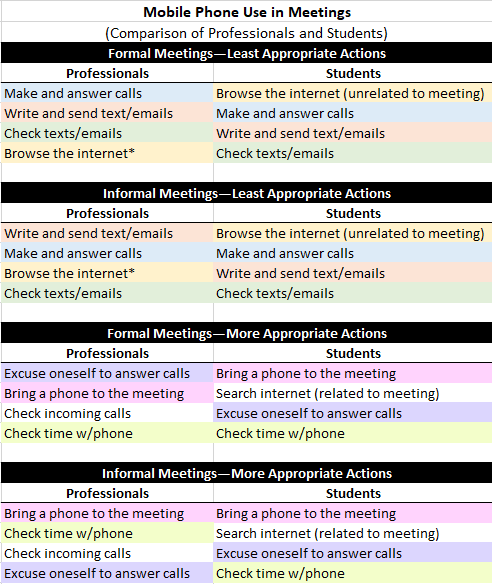|
Today’s ubiquitous mobile phones are used for getting directions, listening to music, watching movies, accessing the internet, sharing on social media, taking photographs, managing calendars, playing games, conducting business, shopping online, and more. The features and benefits of mobile phones are unarguably impressive, but some mobile-phone usage is disruptive to other activities, such as conducting meetings. The Research A recent research article, “Not So Different? Student and Professional Perceptions of Mobile Phone Etiquette in Meetings,” reported research about students’ perceptions of mobile-phone usage in meetings. The objective of the study, by Emil B. Towner, St. Cloud State University; Heidi L. Everett, Minnesota State University Moorhead; and Bruce R. Klemz, St. Cloud State University, was (1) to analyze student perceptions of appropriate mobile phone behavior in formal and informal meetings and (2) to compare the student perceptions with those of working professionals as revealed in a previous study. The anonymous online survey was conducted at a medium-size Midwestern university. In additional to including questions about mobile phones usage in formal and informal meetings, the survey included questions related to gender, age, education, and major. The following table shows a high degree of agreement regarding what professionals and students think about mobile phone usage in meetings. The color coding reveals only minor variations in the rankings. *The original study of professionals did not distinguish between browsing the internet and searching the internet for answers to questions relevant to the meeting.
Probing into variances in student demographics, the data analysis also revealed a slight movement of perception between students’ freshman and senior years, with younger students being more accepting of mobile phone usage in meetings and more mature students being less accepting of checking texts/emails during informal meetings. Additional findings also revealed that females are more likely to use mobile phones in their daily routines but are less likely to view mobile-phone usage in meetings as being appropriate. The Implications Overall, this study showed a high degree of correlation between students’ and professionals’ perceptions about appropriate and inappropriate use of mobile phones in formal and informal meetings. Thus, there does not appear to be a great need to spend significant classroom time teaching mobile phone etiquette in meetings. However, instructors would certainly be justified in taking time to briefly review the most- and least-acceptable mobile-phone behaviors in meetings as identified in this study. You can read the entire article here. Also feel free to share your own thoughts and insights in the comments. How do you teach your students about using mobile phones? How do you control mobile phone usage in your classroom? To learn more, check out Chapter 1 in our textbook on controlling mobile phones in meetings. -Bill Baker Source: Business and Professional Communication Quarterly Image by Headway
1 Comment
|
AuthorsWe're Bill, Matt, and Vince, and we hope these posts will help you more effectively teach business and professional communication. If you like what you read, please consider teaching from our business and professional communication textbook. Archives
January 2022
Categories
All
|


 RSS Feed
RSS Feed